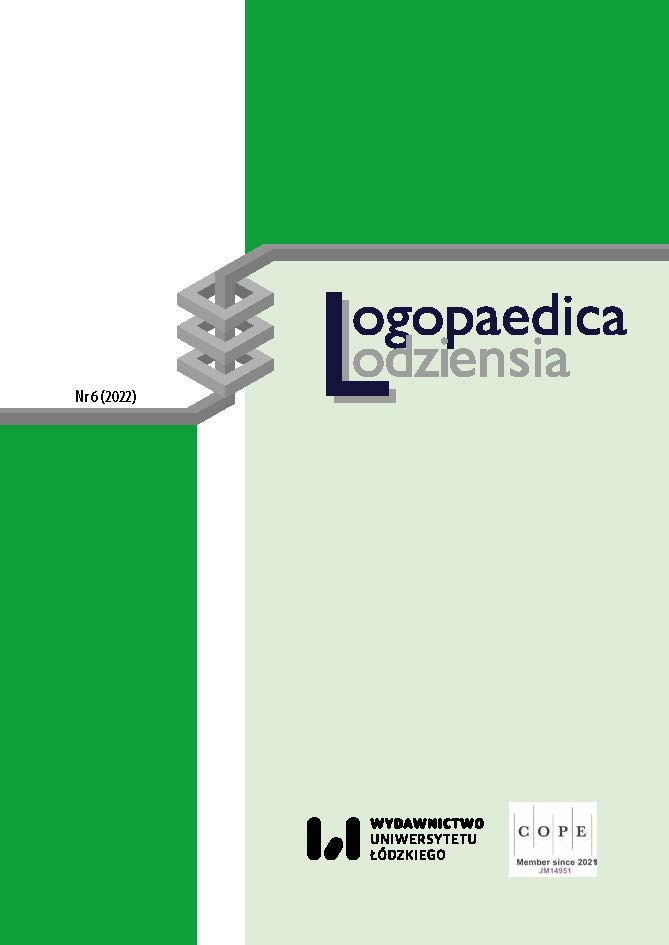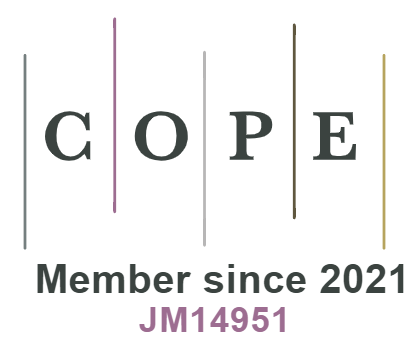Personal Appraisals of Support from the Perspective of Polish, Slovak, and American Children Who Stutter
DOI:
https://doi.org/10.18778/2544-7238.06.18Keywords:
child, the Personal Appraisal of Support for Stuttering, support, stutteringAbstract
Limited research exists about what children who stutter perceive to be helpful and unhelpful listener supports, and no known research exists cross‑culturally. Such information is necessary to better inform clinical intervention and public attitudes at large. This study sought to address that need by measuring listener preferences among children who stutter from diverse backgrounds.
One‑hundred fifty‑one children who stutter from Poland, Slovakia, and the USA completed the child version of the Personal Appraisal of Support for Stuttering. Results were examined descriptively and compared cross‑culturally.
Themes pertaining to very helpful and very unhelpful supports emerged across all groups. Many items fell in the neutral range, suggesting variability among individual speakers.
Based on the groups examined, children who stutter primarily want listeners to be patient, to include them, and to not laugh when they are speaking. Other nuanced preferences underscore the importance of asking individuals about what they perceive to be helpful and unhelpful. Results of this study informed a listener guideline statement and an open‑access informational handout about how to be most supportive of children who stutter.
Downloads
References
American Speech‑Language‑Hearing Association, n.d., Evidence Based Practice, https://www.asha .org/research/ebp/ (accessed: 12.03.2022).
Google Scholar
Blood G.W., Blood I .M., 2016, Long‑term consequences of childhood bullying in adults who stutter: Social anxiety, fear of negative evaluation, self‑esteem, and satisfaction with life, “Journal of Fluency Disorders”, No. 50, pp. 72–84.
Google Scholar
DOI: https://doi.org/10.1016/j.jfludis.2016.10.002
Boyle M.P., Blood G.W., 2015, Stigma and stuttering: conceptualizations, applications, and coping, [in:] K.O. St. Louis (ed.), Stuttering meets stereotype, stigma, and discrimination: An overview of attitude research, Morgantown: West Virginia University Press, pp. 43–70.
Google Scholar
Daniels D.E., Gabel R.M., Hughes S., 2012, Recounting the K–12 school experiences of adults who stutter: A qualitative analysis, “Journal of Fluency Disorders”, No. 37, pp. 71–82.
Google Scholar
DOI: https://doi.org/10.1016/j.jfludis.2011.12.001
Davis S., Howell P., Cooke F., 2002, Sociodynamic relationships between children who stutter and their non‑stuttering classmates, “Journal of Child Psychology and Psychiatry and Allied Disciplines”, No. 43, pp. 939–947.
Google Scholar
DOI: https://doi.org/10.1111/1469-7610.00093
Eggers K., Millard S., Kelman E., 2021, Temperament and the Impact of Stuttering in Children Aged 8–14 Years, “Journal of Speech, Language, and Hearing Research”, Vol. 64(2), pp. 417–432.
Google Scholar
DOI: https://doi.org/10.1044/2020_JSLHR-20-00095
Glover H.L., St. Louis K.O., Weidner M.E., 2019, Comparing stuttering attitudes of preschool through 5 grade children and their parents in a predominately rural Appalachian sample, “Journal of Fluency Disorders”, No. 59, pp. 64–79.
Google Scholar
DOI: https://doi.org/10.1016/j.jfludis.2018.11.001
Hartford E., Leahy M.M., 2007, The perceptions of primary school children of a person who stutters, [in:] J. Au‑Yeung, M.M. Leahy (eds.), Proceedings of Fluency Disorders, Dublin: The International Fluency Association, pp. 217–222.
Google Scholar
Langevin M., 2015, Changing attitudes toward stuttering: What children liked about a stuttering education resource, [in:] K.O. St. Louis (ed.), Stuttering meets stereotype, stigma, and discrimination: An overview of attitude research, Morgantown: West Virginia University Press, pp. 304–309.
Google Scholar
Langevin M., Packman A., Onslow M., 2009, Peer Responses to Stuttering in the Preschool Setting, “American Journal of Speech‑Language Pathology”, No. 18, pp. 264–276, https://doi.org/10.10 44/1058-0360(2009/07-0087)
Google Scholar
DOI: https://doi.org/10.1044/1058-0360(2009/07-0087)
St. Louis K.O., 2010, International Project on Attitudes Toward Human Attributes (IPATHA), Morgantown: Populore, http://www.stutteringattitudes.com (accessed: 12.03.2022).
Google Scholar
St. Louis K.O., 2015a, Epidemiology of public attitudes toward stuttering, [in:] idem (ed.), Stuttering meets stereotype, stigma, and discrimination: An overview of attitude research, Morgantown: West Virginia University Press, pp. 7–42.
Google Scholar
St. Louis K.O., 2015b, Personal Appraisal of Support for Stuttering‑Adult (PASS‑Ad), Morgantown: Populore.
Google Scholar
St. Louis K.O., Weidner M.E., 2015, Personal Appraisal on Stuttering Support‑Child, Morgantown: Populore.
Google Scholar
St. Louis K.O., Irani F., Gabel R., Hughes S., Langevin M., Rodriguez M., Scaler Scott K., Weidner M., 2017, Evidence‑based guidelines for being supportive of people who stutter in North America, “Journal of Fluency Disorders”, Vol. 53(1), pp. 1–13.
Google Scholar
DOI: https://doi.org/10.1016/j.jfludis.2017.05.002
The Stuttering Foundation, n.d., www.stutteringhelp.org (accessed: 12.03.2022).
Google Scholar
Weidner M.E., Junuzovic‑Zunic L., St. Louis K.O., 2020, A comparison of stuttering attitudes among nonstuttering children and parents in Bosnia & Herzegovina, “Clinical Archives of Communication Disorders”, No. 5, pp. 42–53.
Google Scholar
DOI: https://doi.org/10.21849/cacd.2020.00199
Weidner M.E., St. Louis K.O., Glover H., 2018, Changing nonstuttering preschool children’s stuttering attitudes, “American Journal of Speech‑Language Pathology”, No. 27, pp. 1445–1457.
Google Scholar
DOI: https://doi.org/10.1044/2018_AJSLP-18-0019
Weidner M.E., St. Louis K.O., Nakıscı E., Özdemir R.S., 2017, A comparison of attitudes towards stuttering of non‑stuttering preschoolers in the United States and Turkey, “South African Journal of Communication Disorders”, No. 64, pp. 1–11.
Google Scholar
DOI: https://doi.org/10.4102/sajcd.v64i1.178
Weidner M. E., Węsierska K., St. Louis K. O., Scaler-Scott K., 2019, Supporting Children who Stutter: Experiences and Perspectives of American and Polish Parents. Presentation at the World Congress for Stuttering, Hveragerdi, Iceland.
Google Scholar
Węsierska K., St. Louis K.O., Weidner M. E., 2019, Personal Appraisals of Support from the Perspective of Polish Children who Stutter. Poster presentation at the International Association for Logopedics and Phoniatrics, Taipei, Taiwan.
Google Scholar
Węsierska K., Weidner M.E., 2022, Improving young children’s stuttering attitudes in Poland: Evidence for a cross-cultural stuttering inclusion program, „Journal of Communication Disorders”, No. 96, pp. 1–10.
Google Scholar
DOI: https://doi.org/10.1016/j.jcomdis.2022.106183
Węsierska K., Weidner M., Sønsterud H., 2021, Let’s empower children who stutter and their parents so they can speak the changes they wish to see, ISAD 2019 on-line conference. Online: https://isad.isastutter.org/isad-2021/papers-presented-by/research-therapy-and-support/lets-empowerchildren-who-stutter-and-their-parents-wesierska-weidner-sonsterud/ (accessed: 10.03.2022).
Google Scholar
Yaruss J., 2007, Application of the ICF in Fluency Disorders, „Seminars in Speech and Language”, No. 28(4), pp. 312–322.
Google Scholar
DOI: https://doi.org/10.1055/s-2007-986528
Yaruss J.S., Murphy W.P., Quesal R.W., Reardon N.A., 2004, Bullying and teasing: Helping children who stutter, New York, NY: National Stuttering Association.
Google Scholar
Downloads
Published
How to Cite
Issue
Section
License

This work is licensed under a Creative Commons Attribution-NonCommercial-NoDerivatives 4.0 International License.












